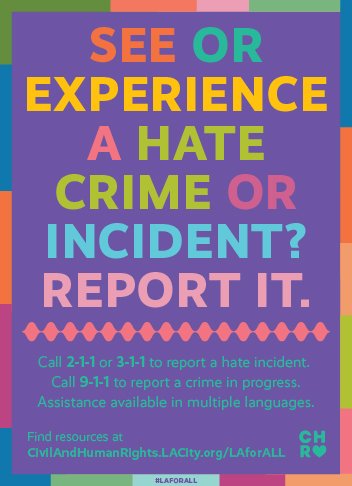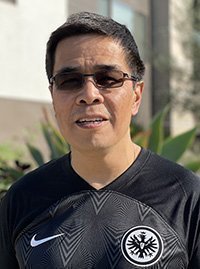Law Enforcers Urge Anti-AAPI Hate Victims to Come Out of the Dark
/(Source: LAPD)
A November 2023 study by the Associated Press and NORC at The University of Chicago (previously the National Opinion Resource Center) indicates that 16 percent of AAPI members claim they were victims of a hate crime. Either AAPI individuals checked the wrong box in the polls or they’re keeping their harrowing ordeals secret from the police.
The research shows that most anti-AAPI hate crimes go unreported. The FBI database that tracks hate crimes tallied only 242 reported crimes attributed to bias against Asian Americans or native Hawaiian and Pacific Islanders in the U.S. in 2019. Innocent victims may be conflicted about going to the authorities to deny their attackers the freedom to continue to harm others. Anti-AAPI hate proliferates when victims share their experiences with public opinion surveys, friends, or counselors but not police departments whose staffs are eminently capable of dealing with offenders who blaze a trail of scars throughout American communities.
When a friend or relative tells you of the pain they endured, whether it’s physical violence, verbal abuse, or property damage, use the discussion as a teaching moment to advise them to call 9-1-1 the next time someone poses a threat to their safety. Police officers are trained to determine whether a bias-related crime occurred and will respond in a firm and effective manner to ensure the public’s safety. As more anti-AAPI hate crimes are reported, municipal, State and Federal authorities will have a suitable number of cases to justify appropriate allocations of resources to protect lives and prosecute offenders.
Identifying and Preventing Hate Crimes
Speaking as the Hate Crime Coordinator for the LAPD, Detective Supervisor Orlando Martinez observes, “Although some AAPI communities are unfortunately ‘used to’ instances of hate, the Los Angeles Police Department needs the community to report crimes and hate incidents in order to formulate a proactive plan to address these issues.
“Significant strides are being made in improving the sensitivity of the police force to the concerns of AAPI communities, as displayed in the Department’s education outreach to the Los Angeles neighborhoods of Chinatown, Filipinotown, Koreatown, Thai Town and Little Tokyo.”
“Too often the community will be aware of problem businesses, employers, and residents, yet not report these instances to the police. Whether for reasons of not wanting to bother the police or not feeling trust in the Department, without these data points to analyze when making our crime prevention strategies, the Department will be unable to take a proactive stance.”
Martinez has held his current position for four of his 30 years as a sworn police officer. “As the Hate Crime Coordinator,” he states, “I write policy and procedures for the Department, conduct training for the 9,000 officers in the Department and the communities of LA. I am the LAPD representative for the Los Angeles Hate Crime Task Force and ensure the Department’s compliance with Federal and State mandated reporting requirements.”
The Nature of Anti-AAPI Hate Crime
The veteran detective notes, “The most common anti-AAPI behaviors are threats of violence (intimidation) or simple assaults. Bystander intervention training in the community is a very helpful tool that can de-escalate situations before they become criminal.”
The addition of a hate finding can markedly increase the consequences of an already serious offense. Martinez explains, “Although the hate crime statute in California denotes violating someone’s civil rights because of bias, Penal Code section 422.6 and 422.75 allow that ‘any’ criminal offense motivated by bias may be amended to a ‘hate crime.’ When an allegation is added, the crime is eligible for additional time or fines when it is determined to be bias motivated; therefore, any crime in the Penal Code can be a hate crime.”
Given the relatively small number of crimes that get reported in the second largest city in the U.S., Martinez observes, “Los Angeles does not have an epidemic of anti-AAPI crimes. In calendar year 2023, there were 16 anti-AAPI hate crimes out of a total of 851 hate crimes. Anti-AAPI hate crimes were less than 1 percent of all hate crimes.”
LAPD Takes Action
Dominic Choi, Los Angeles' first Asian American Chief of Police, was born in Los Angeles. (Source: LAPD)
Significant strides are being made in improving the sensitivity of the police force to the concerns of AAPI communities, as displayed in the Department’s education outreach to the Los Angeles neighborhoods of Chinatown, Filipinotown, Koreatown, Thai Town and Little Tokyo. “The Department received a federal grant specifically to educate officers and conduct outreach to AAPI communities to combat hate crimes.”
When asked whether a particular group has suffered a disproportionate amount of hate crimes, he replies, “Unfortunately, Federal Race designators do not account for the different AAPI communities. However, the majority of motivations were anti-Chinese in regard to the pandemic.” Among the various age groups, “elderly members of communities are the most common targets for bias motivated occurrences.”
Martinez reiterates, “It is the policy of the Department to safeguard the rights of all individuals irrespective of their race or ethnicity, nationality, immigration status, religion, sexual orientation, gender, gender identity, or gender expression, disability and/or association with a person or group with one or more of these actual or perceived characteristics. Any acts or threats of violence motivated by hate or bias, including property damage, harassment, intimidation, or other crimes shall be viewed very seriously and given high priority.”
By now, the LAPD Hate Crimes Coordinator has dispelled any doubt that an emergency call after an anti-AAPI hate incident will receive critical and prompt attention. Residents of other cities and towns can be equally confident that safeguards are in place to eliminate this threat to vulnerable populations. To accomplish this vital work, law enforcement agencies rely on citizens to report all such crimes to protect the lives of the innocent and stop the culprits before they can inflict more pain and destruction.
Anthony Maddela writes and lives in Los Angeles. One of his favorite spots is The Getty Villa in the Pacific Palisades.
More articles from Anthony Maddela








